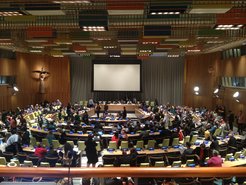The Anthropology of Global Institutions
Maria Sapignoli’s research on global institutions builds on her experience as both a researcher and an intern in the Secretariat of the Permanent Forum on Indigenous Issues, the International Training Centre of the International Labour Organization, and the International Fund for Agricultural Development, and pays close attention to the connections and relationships within and between UN agencies. Complex, kaleidoscopic relationships between actors representing NGOs, states, and UN agencies can be observed in programs oriented towards training, fundraising, economic opportunity, networking, justice lobbying, lawmaking, and diplomacy. She pays particular attention to the use of information technologies in facilitating connections and new initiatives in UN agencies. Through an ethnographic approach that pays particular attention to the works of experts and advocates, Sapignoli hopes to show that the institutions of global governance are social worlds with distinct characters, influenced not only by their formal mandates but also by their connections with civil society, states, transnational corporations, peoples, and publics. They are powerful forces of social change, bringing about (sometimes imposing) reform in the practices of land tenure, agriculture, environmental regulation, financial regulation, gender and the family, governance, and justice. They produce influential forms of knowledge, reinforced by the prestige of international law and the reach of new media, including knowledge about history and about the ‘essence’ of particular rights holders such as indigenous peoples, refugees, women, children, and ultimately humanity itself. Sapignoli’s work in this area calls attention to the ideas, hopes, and daily experiences of those who inhabit and navigate these institutions, and addresses topics of timeless interest: bureaucracy, international law, advocacy and, ultimately, justice.

